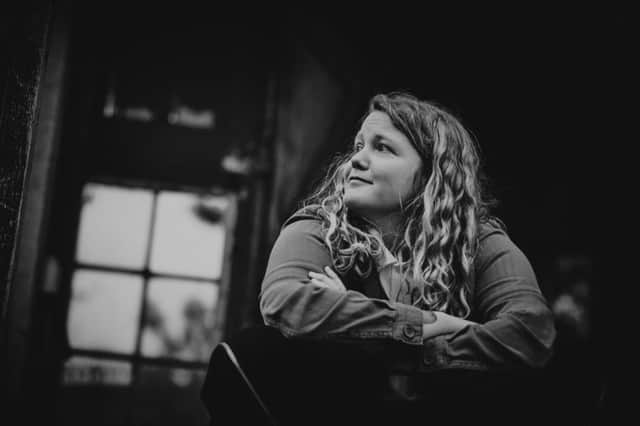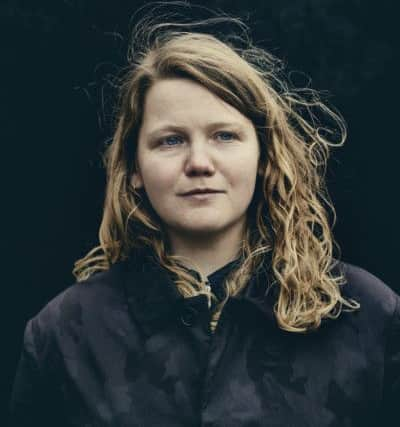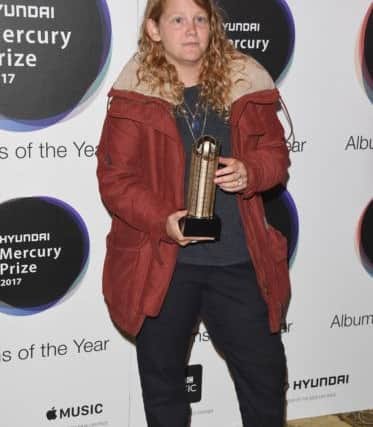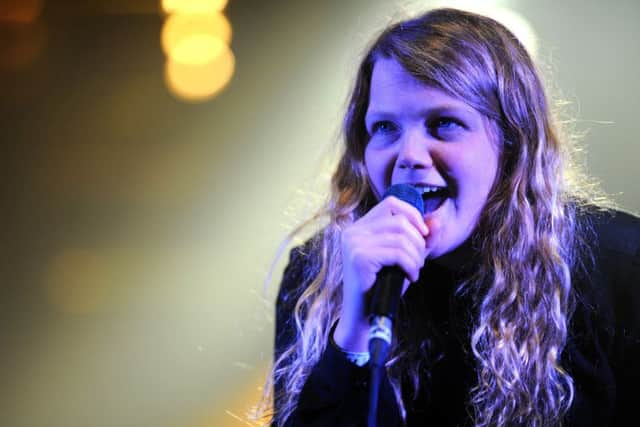Kate Tempest makes her Edinburgh International Festival debut


Words are precious to Kate Tempest. As a performance poet, rapper, actor, novelist and playwright the polymath is an alchemist of the spoken word and they pour out in her blend of hip hop and poetry, rhymes intertwined with post-dubstep electronic beats, delighting audiences from Glastonbury to Glasgow. Influenced by Roots Manuva, Young Fathers and Wu-Tang Clan as much as by Samuel Beckett, James Joyce and WB Yeats, she has the ear of a generation as she voices their concerns – poverty, passion, alienation, gentrification, climate change, class, intolerance, acceptance, loss and love. Each word is considered, revised, worked over, gifted. So it’s no surprise to find that in person Tempest isn’t one for a pat, easy answer to questions, especially since when we speak, she’s in Heathrow airport, about to board a plane, it’s noisy and she can’t hear me very well, lending a comedy element to this interrupted conversation between two people who work with words.
“If you’re up for just like speaking louder than feels necessary, that would be great,” she begins.
We’re talk/shouting about her Edinburgh International Festival debut at Leith Theatre on Friday, part of her tour of her third studio album, The Book of Traps and Lessons. Produced by Rick Rubin, the Grammy-award winning producer and co-founder of the legendary Def Jam label, it sees Tempest evolving once more. The rapping rhythm and basslines are pushed back and her voice goes with the flow of the lyrics rather than the beat, exposed and raw. If the form is different, the message is familiar – keeping connections with those we love, and Tempest employs her knack of making the everyday extraordinary, the mundane monumental.


“I’ve definitely tried to create some tension between the focus of the small everyday observations about this person’s experience – standing at the station, brushing their teeth or lying on the floor looking at the bottom of a chair – with the much bigger, wider context of how an individual life fits into the society, the nation.
“I don’t feel that you can write about the everyday without there being also the eternal in that somewhere. You can’t just separate one thing from everything else that creates it, you can’t just write about one life without writing about many.”
En route to a festival on a remote island off the coast of Norway, Tempest is excited about the trip, and apologises again for the background noise, her south London accent friendly and warm.
“I think it’ll be an amazing festival, but it’s quite an epic travel to get there,” she says.


She could be talking about her career, from rapping in a record store at 16 to performing to thousands at Glastonbury at 33. With three studio albums, 2014’s Everybody Down, 2016’s Let Them Eat Chaos, which focused on the loneliness of seven strangers in a south London street at 4:18am and was also released in book format, and this year’s release, she has twice been nominated for the Mercury Prize, as well as winning multiple literary prizes for her poetry and novels.
Born Kate Esther Calvert, she’s one of five, and was always reading, and writing music and words as a child. “It was just always something I was really keen on doing,” she says. “There’s wasn’t a moment, it was just always there. It was really s**t for ages,” she laughs. “Then it got a bit better.”
Leaving school at 16 to study at the BRIT School for Performing Arts and Technology in Croydon, later adding an English Literature degree from Goldsmiths, University of London, she became Kate Tempest performing on Friday nights in a Carnaby Street hip-hop store, honing her blend of poetry and rap, her flair for observational detail and character.
“I get really nervous now, but I think back then it wasn’t really nerves, I was just really, really keen to be heard. I really wanted to get on a mic, I was really, really ready for it and I was passionate and excited and just full of fury and joy, you know. I was just hot, I was burning up, I wanted to rap, it was amazing.”


As well as Roots Manuva, Tempest was enjoying Too Poetic from Gravediggaz, Lauryn Hill, Bahamadia and “used to go raving a lot to Jungle. It was a really vibrant time and I was immersing myself in everything I could.”
Picked up to support John Cooper Clark, Billy Bragg and Benjamin Zephaniah, she also toured with her band Sound of Rum until they disbanded in 2012 when she wrote her first play, Wasted. In 2012 she also published her first poetry book, Everything Speaks in its Own Way and launched the theatrical spoken word piece Brand New Ancients, which won the Ted Hughes Award in 2013, as well as impressing Rubin.
From 2014 it all kicked off and she moved from the poetry scene into the music industry with Everybody Down, started touring, published her poetry collection Hold Your Own, and was elected a Fellow of the Royal Society of Literature the next year. In 2016 her debut novel, The Bricks That Built The Houses, a raw take on life in London’s underbelly became a bestseller, and she signed to the Big Dada music label. As her exposure increased, there were collaborations with the likes of Loyle Carner, she headlined shows and performed at festivals with her live band, Kwake Bass on drums, Dan Carey on synths and Hinako Omori on keyboards, culminating in being nominated as Best Female Solo Performer at the 2018 Brit Awards.
She comes to Edinburgh fresh from Glastonbury, which was “amazing, a really magical weekend” where her set built up to a classic communal Tempest crescendo by ending with the new album track People’s Faces.
“The end was beautiful. You know you have these kind of moments that you work towards – I don’t really know if it’s even a conscious thing – but you get to the end of it and you realise you’ve been kind of holding your breath, waiting for that moment. I was so happy with having the opportunity to speak those words on that stage to that crowd at that time. It was sunset and it turned dark at the end of the set and it’s the first time I’ve ever looked out at a night time field on one of the big stages, so it was really magic. You get to the end of the set, talking about people’s faces and you can get away with really looking at people! And it was like everybody was involved in that.”
This brings us on to The Book of Traps and Lessons and how Tempest would describe the new album.
“It’s an album,” she says, and laughs. “You’ll ‘ave to listen to it. I don’t know what else to say. You’ll ‘ave to listen to it really. I’m not very good at summing up things like albums.” She laughs.
OK, could she be more specific about the traps and the lessons, talk about that?
“For sure, yeah. The title refers to the speaker of the poems in the album (the speaker of the poems often being Tempest, but she prefers to talk of ‘the speaker’), and going through this particular journey where they are becoming aware of patterns of behaviour in their life that are damaging, the ‘traps’. And in the second half of the album, they’re trying to learn the lessons from these traps and break these patterns of behaviour and move into a more tender and uh, loving way of being in the world.”
Warming to her subject, she explains how it differs from previous albums, the change in form demanding a different process and outcome.
“I’m not locked in with the rhythm, the lyrics sit really out in front and the music is in a more supportive role. It’s very different in that sense to previous albums. The music is extremely important, it’s like the score and I can tell you for sure that if it was a spoken word album, if I was performing without music, the words would have very different resonance, would mean different things. In fact these words wouldn’t exist without the music that accompanies them.
“But the lyrics have been pushed to the front. Rick Rubin encouraged me to strip away everything that made me feel secure in my creative process and try and get closer to the core of my words. He wanted me to break conventions and he wanted [longtime producer] Dan Carey to break musical conventions. For this album to be something original. Where the music and lyrics were independent of each other, that’s the stuff he got excited by. It’s another form, another thing to try, another place to experiment and I feel really happy with what we’ve created.”
Part of Tempest’s creative process is self-expression, and her output is partly semi-autobiographical. She consults others who feature in her work to check she’s not crossing boundaries, and she’s guarded on behalf of others. For example when I ask who she lives with in London she says “I live with who I live with.” When it comes to herself, does she ever regret being so candid, ever feel over exposed?
“No, by the time it comes out it’s been through such a process of draughts and re-draughts and versions and demos that I feel secure with it. I find interviews much more exposing than making work, because the boundaries aren’t as clear. When you’re making lyrics, poems, albums, performances, there are very clear boundaries for keeping yourself and your privacy secure so it doesn’t feel exposing, it feels extremely connective to others. It’s truth-telling, isn’t it?
“I never really think about it. If something feels like it’s private writing it never comes out. If I make a decision to include something then it’s a decision I’ve thought about and considered the implications for how it might be performed. My requirement of it is, is this useful for other people? And if it feels like it is, then it doesn’t feel exposing.”
With three plays to her name Wasted, Glasshouse and Hopelessly Devoted, Tempest is currently working on another. Paradise is a reworking of Sophocles’ Philoctetes and part of the National Theatre of Great Britain’s new season in which eight of the 15 productions are written by women. Starring Lesley Sharp, it will run in the Olivier Theatre next year.
“I’ve really enjoyed it because it takes all of the pressure of narrative structure off you because it’s all there. It’s kind of like a cover song. Here’s this incredible strange play from thousands of years ago about a wounded soldier, suffering, abandoned on an island, and all I’ve done is just try and pull the threads of resonance from that time into this time. I’ve never attempted anything on this scale before, but I’ve done lots of different versions of reimagining old stories in my work, so it feels like an amazing opportunity.”
Tempest’s rise has been meteoric but when the conversation turns to fame, and how she deals with it, she laughs.
“I don’t really feel that that’s what’s going on. Um, sorry!”
Whether it was fame or not that was going on, in 2017 Tempest took time out and retreated to Spain for a year with her partner and her dog. There’s been talk of a past relationship break down, mental health issues, so how does she feel looking back now?
“Um, well, I don’t feel like this is the right time to go into that,” she says. Fair enough, she’s in a public area in Heathrow airport, we’re shouting down the phone and she’s just told me she finds interviews exposing. In any case it’s time for her to go, she and her band have a plane to board, so with another apology and a thanks, she has the final word. “Bye.”
But soon a message from Kate pings into my email. She hopes I got everything I needed but if I have other questions if I email them she’ll answer when she lands.
I fire some off, not really expecting a response: What is she planning for the Edinburgh International Festival show?
Has she played Scotland much and how has she found the reaction to her music here?
How does she feel to be playing in Leith, the home of Young Fathers, one of her big influences?
But back the answers come.
“I’m planning to play the whole album live with a few older songs too.”
“I have loved my gigs in Scotland. In fact I tried out Keep Moving Don’t Move and People’s Faces for the first time ever at a poetry gig in Glasgow in 2016 and the response from the audience encouraged me to persevere with Keep Moving Don’t Move, which I was considering scrapping.
“Playing Brand New Ancients at the Traverse theatre for a week for the Festival in 2013 was one of the absolute highlights of that show’s life and I loved hanging out in the city and getting to know my way around. I have some friends in Dumfries and Galloway (Clare Uchima, who plays synth with me, has family and friends there) so it always feels like a homecoming of sorts to play Scotland. There’s brilliant poetry in Glasgow especially. And there’s an incredible film director called Rianne White who I’m working with at the moment who is from Edinburgh, so I feel a good creative link with the place.
“It’s a great honour to play in Young Fathers’ home town. I love them and have huge respect for what they make and how they make it.”
Kate Tempest. She’s a woman of her word.
Kate Tempest is at the Leith Theatre on Friday, £30, www.eif.co.uk